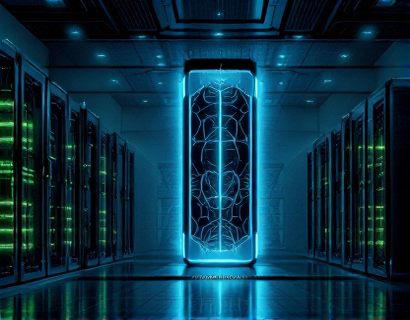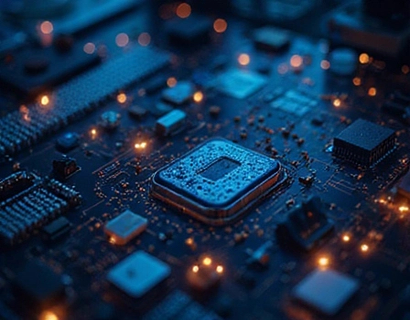Blockchain-Enabled Registry Software: Revolutionizing Data Management
In an era where data is the new currency, the importance of robust, secure, and efficient data management systems cannot be overstated. Traditional registry management systems often fall short in providing the necessary security, transparency, and efficiency required by today's data-driven environments. Blockchain-enabled registry software emerges as a transformative solution, offering a new paradigm for data management. This article delves into the intricacies of how blockchain technology is reshaping the landscape of registry management, providing unparalleled benefits to professionals and enthusiasts alike.
Understanding Blockchain Technology
Before exploring the applications of blockchain in registry management, it's essential to grasp the fundamental concepts of blockchain technology. At its core, a blockchain is a decentralized digital ledger that records transactions across multiple computers in such a way that the registered transactions cannot be altered retroactively. This technology ensures data integrity and transparency through a combination of cryptographic hashing, consensus mechanisms, and distributed networks.
Each block in the chain contains a cryptographic hash of the previous block, a timestamp, and transaction data. This structure creates an immutable chain of blocks, making it extremely difficult to alter any information without detection. The decentralized nature of blockchain means that no single entity has control over the entire network, reducing the risk of centralized points of failure and enhancing security.
Enhanced Security in Registry Management
Security is paramount in registry management, where sensitive data such as identities, property records, and legal documents are stored. Blockchain-enabled registry software significantly enhances security through several mechanisms.
Firstly, the immutability of blockchain ensures that once data is recorded, it cannot be altered or deleted. This feature prevents unauthorized modifications and tampering, providing a high level of data integrity. Secondly, the use of cryptographic hashing and digital signatures ensures that only authorized parties can access and validate transactions. This cryptographic security layer protects against unauthorized access and ensures the authenticity of data.
Moreover, the decentralized nature of blockchain reduces the risk of single points of failure. Traditional centralized systems are vulnerable to attacks such as DDoS (Distributed Denial of Service) and data breaches, as they rely on a central server. In contrast, blockchain's distributed network distributes data across multiple nodes, making it resilient to such attacks.
Transparency and Trust
Transparency is another critical aspect of blockchain technology that greatly benefits registry management. In a blockchain-based system, all transactions are recorded on a public ledger that is accessible to all participants. This transparency ensures that all stakeholders can verify the authenticity and integrity of the data, fostering trust among users.
For instance, in property registry management, stakeholders such as buyers, sellers, and regulatory bodies can independently verify property ownership and transaction history. This level of transparency reduces disputes and fraud, streamlining processes and building trust among all parties involved.
Efficiency and Streamlining Processes
Blockchain-enabled registry software not only enhances security and transparency but also significantly improves efficiency. Traditional registry management systems often involve multiple intermediaries, manual processes, and paper-based records, leading to delays, errors, and increased costs.
By automating and decentralizing registry processes, blockchain technology eliminates the need for intermediaries and reduces manual interventions. Smart contracts, self-executing contracts with the terms directly written into code, can automate routine tasks such as verification and enforcement, further streamlining operations.
For example, in the context of supply chain management, blockchain can track the movement of goods from origin to destination, ensuring real-time visibility and reducing the risk of counterfeit products. This level of efficiency not only saves time and resources but also enhances the overall reliability of the system.
Use Cases in Various Industries
The applications of blockchain-enabled registry software extend across various industries, each benefiting from the unique advantages it offers.
Property Management
In property management, blockchain can revolutionize the way property records are maintained and transferred. By recording property ownership and transaction history on a blockchain, the process becomes transparent, secure, and efficient. This reduces the risk of fraud, speeds up transaction times, and lowers administrative costs.
Identity Verification
Identity verification is another critical area where blockchain can make a significant impact. By storing identity data on a blockchain, individuals can have control over their personal information, ensuring its security and privacy. Governments and organizations can use this technology to verify identities quickly and securely, reducing the risk of identity theft and fraud.
Healthcare Records
In the healthcare sector, blockchain can enhance the management of patient records. By storing medical histories on a blockchain, patients can have a secure and portable record that is accessible to authorized healthcare providers. This ensures that medical information is accurate, up-to-date, and easily shareable, improving patient care and reducing administrative burdens.
Intellectual Property
For creators and businesses, blockchain can provide a robust solution for managing intellectual property rights. By recording copyrights, patents, and trademarks on a blockchain, creators can prove ownership and track usage, reducing disputes and ensuring fair compensation.
Challenges and Considerations
While the benefits of blockchain-enabled registry software are clear, there are several challenges and considerations that organizations must address when implementing such solutions.
Firstly, scalability remains a significant challenge for many blockchain platforms. As the number of transactions increases, the network may face performance issues. However, ongoing developments in blockchain technology, such as layer 2 solutions and sharding, are addressing these scalability concerns.
Secondly, regulatory compliance is a critical factor. Different regions have varying regulations regarding data privacy, security, and usage. Organizations must ensure that their blockchain solutions comply with local and international laws to avoid legal issues.
Lastly, the adoption of blockchain technology requires a shift in mindset and processes. Organizations need to invest in training and education to ensure that their teams are equipped to leverage the full potential of blockchain-enabled systems.
Future Trends and Innovations
The integration of blockchain technology in registry management is just the beginning. As the technology matures, we can expect several exciting trends and innovations.
One such trend is the integration of blockchain with other emerging technologies like the Internet of Things (IoT) and artificial intelligence (AI). Combining these technologies can lead to more intelligent and automated registry systems, further enhancing efficiency and security.
Another area of innovation is the development of cross-chain interoperability, allowing different blockchain networks to communicate and share data seamlessly. This interoperability can create a more connected and cohesive ecosystem for data management.
Additionally, the rise of decentralized finance (DeFi) and non-fungible tokens (NFTs) is opening new avenues for using blockchain in registry management, particularly in asset tokenization and ownership verification.
Conclusion
Blockchain-enabled registry software represents a significant leap forward in data management, offering enhanced security, transparency, and efficiency. By leveraging the unique properties of blockchain technology, organizations across various industries can transform their registry processes, build trust, and drive digital transformation.
While challenges exist, the ongoing advancements in blockchain technology and the growing adoption by professionals and enthusiasts signal a promising future. As more organizations recognize the value of blockchain in registry management, we can expect to see widespread implementation and further innovations in this space.










































